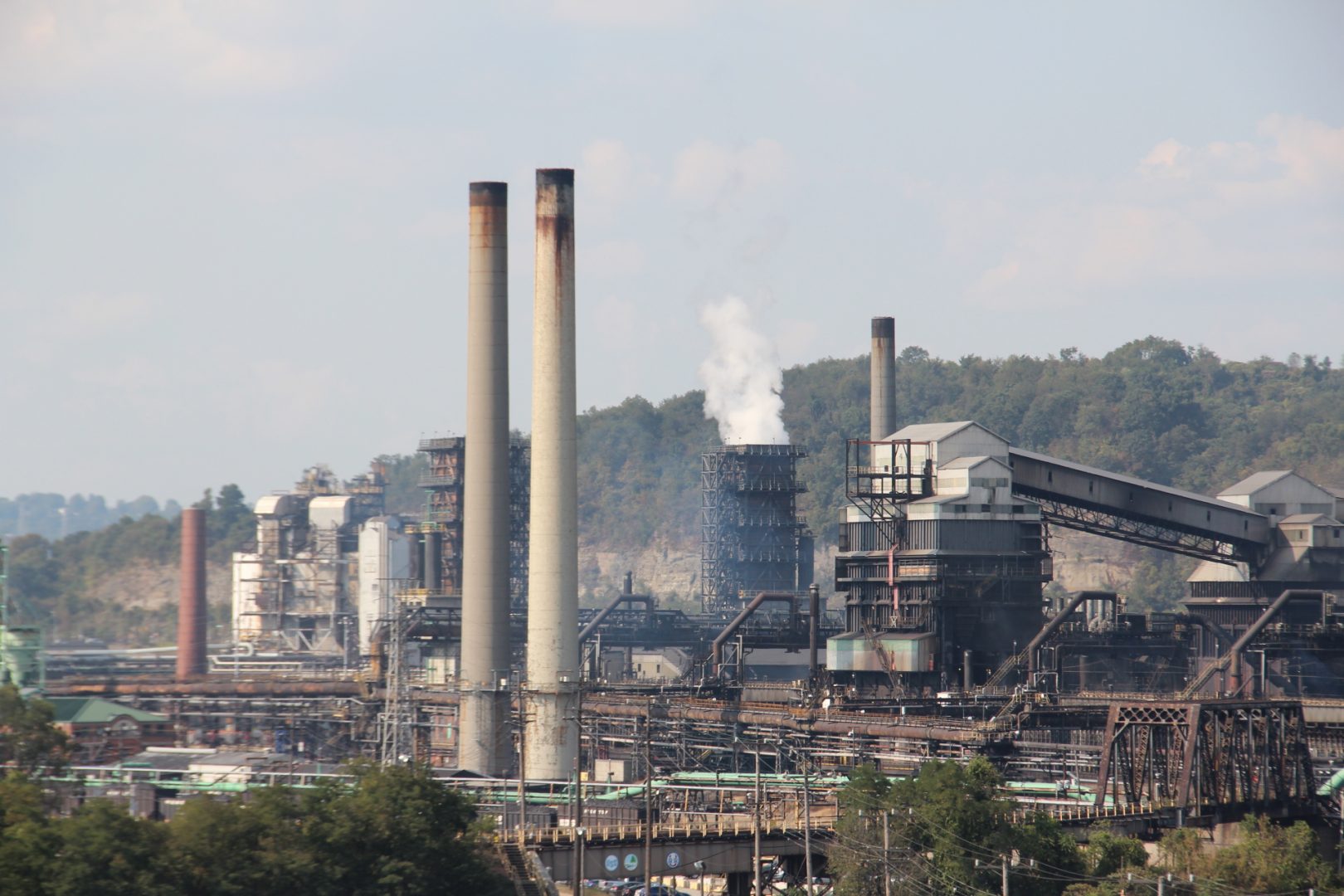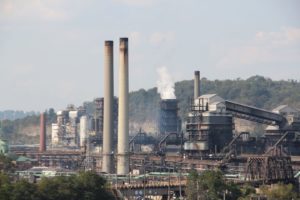
PENNSYLVANIA (March 26, 2024) Today, federal Judge Hardy signed the proposed consent agreement between Clean Air Council, PennEnvironment, and U.S. Steel. This is the final step in finalizing this historic consent decree and citizen suit penalty against U.S. Steel for their ongoing air pollution violations due to power outages at the Clairton Coke Works. The agreement mandates that U.S. Steel will pay a $5 million penalty — by far the largest in a Clean Air Act citizen enforcement suit in Pennsylvania history, and one of the three largest ever nationally. Most of the penalty money ($4.5 million) will fund public health projects directly benefiting Mon Valley communities suffering from poor air quality near the three U.S. Steel plants.
Clean Air Council Executive Director Alex Bomstein issued the following statement:
“Today marks a historic step forward in protecting Mon Valley residents from harmful pollution. It is a huge win that Judge Hardy has approved this settlement without changes and that it now has the power of the court behind it. This landmark agreement will go a long way in funding much-needed public health projects and holding U.S. Steel accountable for their operations.”
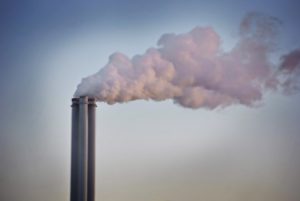
$42 million settlement of Clean Air Act enforcement suit will upgrade Clairton plant, reduce emissions, create public health funds
PITTSBURGH – The statewide environmental groups PennEnvironment and Clean Air Council announced Friday that they will file in U.S. District Court on Monday a proposed consent decree in settlement of their Clean Air Act lawsuit against United States Steel Corporation. If the court, as expected, approves the $42 million agreement, it would resolve a case alleging thousands of violations of air pollution standards that stemmed from a catastrophic 2018 fire and subsequent pollution control system breakdowns at the company’s three Mon Valley Works facilities: the Clairton Coke Works and the Edgar Thomson and Irvin steel mills.
The agreement mandates that U.S. Steel will pay a $5 million penalty — by far the largest in a Clean Air Act citizen enforcement suit in Pennsylvania history, and one of the three largest ever nationally. Most of the penalty money ($4.5 million) will fund public health projects directly benefiting Mon Valley communities suffering from poor air quality near the three U.S. Steel plants.
“Clean air is a right, not a privilege, for all Pittsburghers,” said David Masur, executive director of PennEnvironment, the citizen-based non-profit and state group for Environment America. “This historic announcement shows that we will not sit by while illegal air pollution rains down on nearby communities and the Pennsylvanians who live in them.”
The settlement also includes approximately $37 million worth of pollution control and plant reliability upgrades to prevent future breakdowns of essential pollution control systems. To further reduce toxic emissions, U.S. Steel must permanently close more than 10% of the pollution-spewing coke ovens used to process coal used in steel-making.
“This settlement will achieve the three objectives we had when we filed this case,” said Alex Bomstein, Clean Air Council Legal Director. “First, U.S. Steel must upgrade the aging Clairton Coke Works to reduce toxic emissions and prevent future breakdowns; second, the company must pay a substantial monetary penalty to deter future violations; and third, most of that penalty money will directly benefit the communities suffering from poor air quality near U.S. Steel’s Mon Valley facilities.”
U.S. District Judge W. Scott Hardy cannot approve the settlement until a legally required 45-day waiting period ends. Attorneys for the groups say that the announced sale of U.S. Steel to Nippon Steel Corporation will not affect the settlement. The agreement expressly states that any sale of the company requires the purchaser to agree to assume all outstanding terms, conditions and obligations of the proposed consent decree.
The suit, in which the Allegheny County Health Department (ACHD) intervened as a co-plaintiff, was filed in response to 102 consecutive days of massive, illegal emissions of sulfur dioxide and hydrogen sulfide after a catastrophic fire at the Clairton Coke Works on Christmas Eve in 2018. That blaze, caused by corroded equipment and defective safety systems, knocked out several essential pollution controls at Clairton, which the Irvin and Edgar Thomson steel mills also rely on – yet U.S. Steel continued to run those plants without these legally mandated controls. Violations caused by two subsequent breakdowns at the Clairton Coke Works, in June 2019 and July 2022, were also included in the suit.
The terms of the proposed settlement agreement include:
- The aforementioned $37 million worth of improvements. U.S. Steel spent $17.5 million to replace deteriorating equipment and dramatically upgrade preventive maintenance programs after this suit was filed, and must now complete two additional capital projects, costing approximately $19.5 million, to prevent pollution control outages.
- Payment of $5 million, split between ACHD, the Jefferson Regional Foundation, and Allegheny County Department of Economic Development. The latter groups must use their combined $4.5 million portion exclusively to fund public health programs and air quality improvement projects in the Mon Valley communities affected by U.S. Steel’s emissions.
- U.S. Steel must pay automatic penalties for any future pollution control system outages, no matter the cause. These penalties increase with the seriousness and duration of an outage, to as much as $112,500 per day.
- U.S. Steel must accept more stringent permit limits on the allowable amount of hydrogen sulfide in the treated coke oven gas it uses as fuel.
- U.S. Steel must permanently shut down coke oven Battery 15, which consists of 60 highly polluting ovens – more than 10% of the remaining coke ovens at Clairton Works.
The federal Clean Air Act authorizes private citizens affected by violations of the act to sue violators directly, and to seek civil penalties and court-ordered compliance orders when government regulators have not done so. A separate class action lawsuit, seeking damages on behalf of roughly 100,000 Mon Valley residents for exposure to the excess pollution following the 2018 fire, is currently being litigated in state court.
“The Clean Air Act was created to protect people from threats to the quality of their air, which, in turn, often negatively affect their quality of life,” said Douglas H. Phelps, chair of Environment America’s board of directors. “Our goal with this case was not only to hold U.S. Steel accountable for its illegal pollution, but also to protect people well beyond the Mon Valley by creating an incentive for other polluting companies to keep their neighbors safe.”
Clairton Coke Works and the Edgar Thomson steel mill have long been a focus of the regional environmental community. PennEnvironment Research & Policy Center ranked the Clairton Coke Works as Allegheny County’s worst air polluter in its 2023 “Toxic Ten” study because the facility released more than 1.1 million pounds of toxics to the county’s air in 2021. The Edgar Thomson mill was the only non-power plant ranked in PennEnvironment Research & Policy Center’s “Dirty Dozen” list of Pennsylvania’s top climate-polluting facilities.
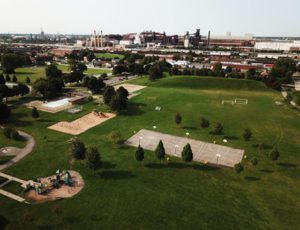
HARRISBURG, PA (October 30, 2023)– Today, a number of speakers from environmental and public health organizations, as well as academia and industry gave testimony about House Bill 170 to members of the House Environmental Resources and Energy Committee and the public. In HB 170, a setback or buffer refers to the minimum required distance between various oil and gas industry infrastructure, like fracking wells, a specific use (shale gas well pad) and an existing structure, boundary, natural resource, or any other area that needs protection in the interest of health, safety, and the general welfare of the public. Five speakers called for increased protective buffers, or setbacks, from oil and gas infrastructure. The two industry-related speakers were not supportive of the current bill, but were open to further discussions about increased setback distances. Right now, oil and gas infrastructure is allowed within an easily waived 500 feet of homes, schools, and buildings, but testifiers supported House Bill 170 and recommended that operations be moved back to at least 2,500 feet between unconventional wells and buildings, as well as greater distances for schools, nursing homes, hospitals, and places that serve people with intellectual or developmental disabilities. Twenty Pennsylvania environmental and health organizations submitted a written comment supporting the bill. The Protective Buffers Coalition, comprised of some of those same organizations, have long called for even greater distances and setbacks and from additional gas-related infrastructure.
“There is broad support for increased setback distances between gas infrastructure and Pennsylvania residents,” said Lois Bower-Bjornson, Washington County Resident, Clean Air Council. “A 2021 poll conducted by Data for Progress showed that Pennsylvanians support increased setback distances between gas infrastructure and homes, schools, hospitals, childcare centers, and other residential buildings by a 60% margin. Since 2021, Clean Air Council and partners have assisted 4,392 Pennsylvania residents in expressing their support for increased setbacks to their local elected officials.”
Recent health studies found that people living in close proximity to oil and gas infrastructure are at risk for a host of health issues including cancer, respiratory disease, low birth weight, and cardiovascular disease. By creating larger setbacks, or buffers, Pennsylvanians will be protected from harmful pollutants like benzene, hydrogen sulfide, and carbon disulfide.
“It’s clear that a 500 foot buffer from homes, childcare centers, schools, businesses, hospitals, and nursing homes is way too small, said Ned Ketyer, MD, President of Pennsylvania Physicians for Social Responsibility. “Increasing the distance between the activity and where people (especially children) live, work, learn, and play is only one step, but an important one, to protect the health of Pennsylvanians from dangerous fracking emissions consisting of fine particulate matter (PM2.5), volatile organic compounds (VOCs like benzene, toluene, and formaldehyde), ozone-forming nitrogen oxides, heat-trapping methane, radon gas, and many other toxics.”
“We observed elevated odds of cancer associated with UOG (unconventional oil and gas) activity within 2 km (more than 6,560 ft), which far exceeds any existing setback distance,” said Cassandra Clark, PhD, Postdoctoral Fellow, Yale School of Public Health. “Further, although effect sizes diminished with increasing buffer size, the odds of developing ALL (acute lymphoblastic leukemia) were still elevated for children living within 5 and 10 km of UOGD. Our results in the context of the broader environmental and epidemiologic literature suggest that existing setback distances are insufficiently public health protective, particularly for vulnerable populations like children, and should be revisited and informed by more recent data.”
“The optical gas imaging footage Earthworks has captured shows air pollution from unconventional oil and gas development regularly goes beyond facility fencelines,” said Melissa Ostroff, MPH, Earthworks Pennsylvania Policy and Field Advocate. “While this pollution is not visible to the naked eye, our camera provides visual evidence that communities living in close proximity to well pads and other fracking infrastructure are breathing in pollution from the industry. Policymakers must take this reality into account by increasing setback distances for oil and gas facilities.”
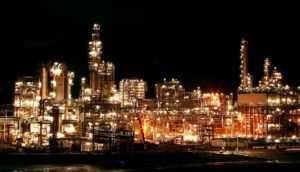
Environmental Integrity Project and Clean Air Council Sue Shell Polymers Monaca Plant Near Pittsburgh to Halt Illegal Emissions of Smog-Forming Pollutants
Pittsburgh — The Environmental Integrity Project and Clean Air Council filed a federal lawsuit against Shell today for repeatedly violating permitted air pollution limits from a massive new plastics production plant northwest of Pittsburgh, which opened last year.
In a lawsuit filed in the U.S. District Court for the Western District of Pennsylvania, the environmental groups called for strict penalties and a halt to the illegal release of smog-forming pollutants from the Shell Polymers Monaca plant in Beaver County, on the banks of the Ohio River.
“Shell received $1.6 billion in taxpayer subsidies from the state to build this plant. The very least this international corporation can do is to follow the law and not make Pennsylvania taxpayers breathe in their illegal pollution,” said Sarah Kula, attorney for the Environmental Integrity Project.
Joseph Minott, Executive Director of the Clean Air Council, said: “Shell’s persistent law-breaking must end. The community will not tolerate dangerous pollution events that risk the health of families across Beaver County and beyond.”
The roughly $6 billion Shell Monaca plant transforms a product of natural gas (ethane), extracted through hydraulic fracturing in the region’s shale formations, into tiny plastic pellets used to manufacture single-use plastic goods like soda bottles and plastic packaging.
The plant has repeatedly violated limits that must be met on a 12-month rolling basis for nitrogen oxide (NOx) and volatile organic compound (VOC) air pollution, which contribute to smog, asthma attacks, and lung disease, according to state records and the lawsuit. The VOCs include benzene, a known carcinogen.
The facility has also shaken the surrounding community by releasing clouds of black smoke from its flares during malfunctions and odors that have caused residents to feel sick.
Pennsylvania Department of Environmental Protection (DEP) records show 12 state notices of air pollution violations at the Shell plant since January of 2022, but no enforcement actions or penalties by the state.
State records also show that Shell submitted 39 reports of malfunctions at the plant during the same time period, including flaring on February 13 that released large plumes of black smoke and flames for hours during an “upset” incident in the ethylene cracking unit.
The most recent problems at the Shell plant include an accident on April 11, when a malfunction at its wastewater treatment plant released high levels of benzene, as measured by fenceline air monitors. The air monitors measured benzene as high as 185 micrograms per cubic meter – which is more than six times higher than federal guidelines for short-term exposure to this pollutant.
Local residents reported strong odors, headaches, watery eyes, irritated throats, and nausea during the benzene release incident.
Because of all the violations and ongoing problems at the plant, the Clean Air Council and Environmental Integrity Project sent a letter to DEP on February 17 urging the state to temporarily halt operations at the Shell plastics plant to protect the health of nearby residents.
The same day, the groups sent Shell a notice of intent to sue for violating, within a few months, the chemical plant’s 12-month permit limit on nitrogen oxides. Previously, the groups sent Shell another notice on February 2 because of other violations of the plant’s air permit, including a violation of prohibition on certain “visible emissions,” including black smoke from flares.
Under the federal Clean Air Act, plaintiffs must send notices of intent to sue at least 60 days before filing a complaint in federal court.
“The repeated and ongoing … violations at the plant harm the health and disrupt the lives of the (Clean Air Council’s) members and other individuals who live, go to school, recreate, and work near the plant,” the lawsuit filed today states.
For a copy of the lawsuit, click here.
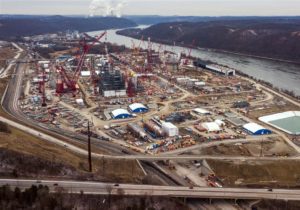
Pittsburgh, PA — A pair of environmental organizations today sent a letter to Pennsylvania urging the state to temporarily halt operations at a Shell plastics chemical plant northwest of Pittsburgh that has repeatedly violated air pollution limits and recently released plumes of black smoke for several hours.
Clean Air Council and the Environmental Integrity Project asked the Pennsylvania Department of Environmental Protection to temporarily halt operations of the Shell Polymers Monaca plant in Beaver County until the company can demonstrate it can operate in compliance with pollution control laws.
The two groups also today filed a notice of intent to sue Shell for violating the chemical plant’s 12-month permit limit on nitrogen oxides (NOx), which contribute to asthma attacks, lung disease, and (in the environment) smog and acid rain. This is the second notice from the groups in three weeks: On February 2, the organizations sent a notice to Shell for other violations of the plant’s air permit, including a 12-month limit on volatile organic compounds (VOCs), which also contribute to smog and health problems, and a prohibition on certain “visible emissions,” including black smoke from flares.
Under the federal Clean Air Act, plaintiffs must send notices of intent to sue at least 60 days before filing a complaint in federal court.
“DEP must act quickly to stop Shell’s ongoing violations of pollution limits that are meant to protect public health” said Sarah Kula, attorney for the Environmental Integrity Project. “Since the plant has come online, Shell has struggled to meet its permit limits, and DEP needs to order a pause to operations until Shell can comply with the law.”
“We will continue to hold Shell accountable as long as they continue to violate the law,” said Joseph Minott, Clean Air Council Executive Director and Chief Counsel. “The health and environmental risks that come with pollution exceedances can harm communities and the region for generations to come. DEP must put the plant on hold until Shell can get its act together.”
On Monday, the Shell plant’s flare released large amounts of black smoke over the course of several hours. BreatheCam.org footage of the February 13th event can be found here. Plants often use these flaring events to burn off chemicals rather than vent directly into the atmosphere, but Shell’s permit does not allow the kind of visible emissions that occurred on Monday. When a flare is not operating properly, it can release dangerous air pollution, including fine particulate matter, benzene, hexane, formaldehyde, mercury, arsenic, and other organic hazardous air pollutants.
In 2022, Shell emitted 346 tons of NOx, which exceeded its permitted annual NOx emissions (328.8 tons of NOx in a 12-month period). From August to December 2022 alone, the plant emitted 310 tons of NOx – nearly reaching the 12-month limit during this five month period.
For a copy of the letter to the Pennsylvania Department of Environmental Protection, click here. For the most recent notice of intent to sue with exhibits, click here.
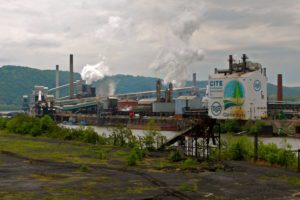
October 14, 2021 – Allegheny County’s Monongahela Valley (Mon Valley) was formerly the steel capital of the world. This region, just outside of Pittsburgh, has produced massive quantities of steel over generations. Unfortunately, along with steel production came large quantities of air pollution. Today, much of the prosperity from the industry has moved on from the region, but the industry and the pollution that comes with it still remains. Three facilities remain operational to this day: the Edgar Thomson Steel Works, the Clairton Coke Works, and the Irwin Plant. Together, they make up the Mon Valley Works complex. These facilities emit harmful air pollutants including fine particulates (PM), hydrogen sulfide (H2S), sulfur dioxide (SO2), ammonia (NH3) and benzene.
In recent years, levels of air pollutants have repeatedly exceeded federal health-based standards. Pollution in the Mon Valley is exacerbated by weather inversions that trap emissions in the valley and cause them to become more concentrated closer to where people breathe. The constant pollution from the operation of the U.S. Steel facilities combined with regular weather inversions leads to bad air quality that negatively impacts the health of nearby residents, many of whom live in environmental justice communities.
With support from the Clean Air Council and allies Clean Water Action and One Pennsylvania, residents of Mon Valley communities near the US Steel facilities have banded together to form the grassroots community organization Valley Clean Air Now (VCAN). VCAN fights for the improved health outcomes that would come from US Steel adhering to its air permit. The Council supports the group by educating residents about the negative health and quality of life impacts from the facilities. VCAN seeks to address the root cause of air pollution by demanding that regulators enforce existing limits on Mon Valley Works facilities and tighten air quality regulations that cover them.
The community group also works to mitigate the negative health impacts residents are already experiencing. This year, the Council worked with VCAN on an initiative to purchase indoor air filters to place in the homes of the most vulnerable community residents. After a pilot project in 2020, residents who received the indoor air filters reported that these filters had a major impact on their health and quality of life. The filters are a valuable educational tool that highlights how air pollution has been impacting the health of local residents. This year, VCAN seeks to expand the pilot beyond the initial community of Clairton to include other impacted municipalities. VCAN has sought funding both from the Allegheny County Health Department Clean Air Fund and the 2019 Community Benefit Trust that are both funded by air pollution fines. To pursue the Benefit Trust money, the Council supported VCAN residents in attending city council meetings in Clairton and Glassport to advocate that some of the funding be used for air filters. The Council also assisted VCAN in meeting with state representatives and county elected officials to discuss the importance of addressing the health impacts of the three Mon Valley Works facilities.
Others in Allegheny County can help these efforts by working with the Council and its neighborhood advocates to urge local elected officials such as the Allegheny County Executive and members of Allegheny County Council to enforce existing air pollution rules and strengthen air quality regulations. The Council is always looking to work with local residents to become advocates in Allegheny County to demand air quality improvements in all corners of the county.
For more information, contact Jay Ting Walker, Advocacy Coordinator, jwalker@cleanair.org
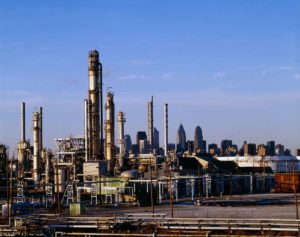
July 7, 2021 – The City of Philadelphia was one of the country’s first industrial hubs. While much of its large polluting industry has diminished over the years –there are some facilities that still emit toxic air emissions that impact public health and the environment. Generally federal, state and local governments have done a poor job of protecting public health from hazardous emissions that can cause cancer and other serious health problems. Yet we must come to grips with this most serious type of public health threat from air pollution. This is particularly true of communities that live in deep poverty and already suffer from poorer public health outcomes. The city of Philadelphia has more people living in deep poverty than any other large city in the United States.
Regulating toxic air pollution has proven to be particularly difficult to regulate since there is often no absolute safe level for an air pollutant that causes cancer or neurological damage. The only 100% safe solution would be to shut down all sources of toxic pollution from large factories, smaller industries such as dry cleaners and gas stations, and cars and trucks. Often the regulations of toxic air emissions are not based on the actual health threat but rather on what technology exists to lower emissions while still allowing the industry to operate.
The Council has long advocated that the city develop regulations to limit emissions of toxics based on public health impacts. The state and federal government should also. In Philadelphia air regulations are adopted by the city’s Air Pollution Control Board. (APCB). Air Management Services (AMS), a part of the Philadelphia Department of Public Health drafts the proposed regulations with input from city lawyers for review and adoption by the APCB.
In 2019, working with the APCB and groups like Clean Air Council, AMS announced that it would amend and strengthen its Air Management Regulation VI (AMR6) which regulated air toxics.
The proposed amended regulation would call for all new Title V (major source) permits and renewals to go through a risk screening process. If the risk from a particular pollutant went above a certain threshold it would trigger a risk assessment and the facility would have to show that it can lower its emissions and reduce harms to the impacted community in order to continue to operate in the City. If the facility could not properly do this, it would be denied its operating permit. It was a game changer. It is difficult for the city to adopt stronger regulations than the state or federal government for fear of making its businesses anti competitive. But both AMS and the APCB were interested in looking at this new approach to reducing air pollution risk in the City.
The Council has been actively pushing for such an approach to toxic pollution for many years. The proposal to amend AMR6 comes on the heels of New Jersey’s recent adoption of a similar law in late 2020. Pennsylvania should follow suit. This law requires that the New Jersey Department of Environmental Protection (NJDEP) to assess the public health and environmental risks that facilities renewing or amending licensing permits create for overburdened communities (low-income communities, communities of color, or communities with limited English proficiency).
The Council is pleased that Philadelphia is moving to better regulate the threat from toxic air pollution but is urging it to go further than what is proposed. The Council has urged the APCB and AMS to take up this opportunity to further decrease the risk thresholds and to look at the aggregate risk posed by multiple pollutants and multiple facilities so that it is more protective for the City’s residents, especially the most vulnerable — its children, elderly, and those with preexisting conditions.
The APCB has an opportunity to pass a regulation more protective than that of New Jersey and set a standard for Pennsylvania and large cities to follow.
For more information contact John Lee, Public Health Director, jlee@cleanair.org.
Along the Delaware River in the southern part of Delaware County refineries and incinerators have been poisoning the air for decades, negatively impacting residents’ health and quality of life.
On Saturday, June 26, residents of Chester, Marcus Hook, and surrounding Delaware County communities welcomed participants of the “Walk for Our Grandchildren” into their neighborhoods to draw attention to local environmental justice and public health issues. The Walk for Our Grandchildren included several dozen grandparents walking from Scranton, PA to Wilmington, DE over the course of a week to highlight the impact of the fossil fuel industry on local communities, and to call on the Biden administration to take stronger actions to address climate change.
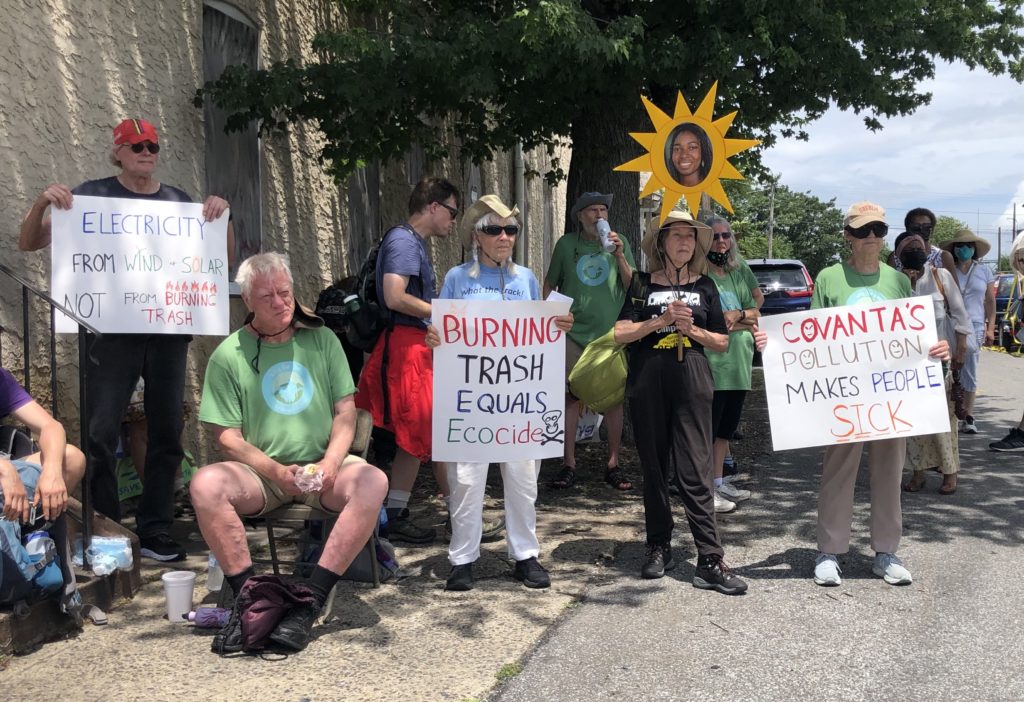
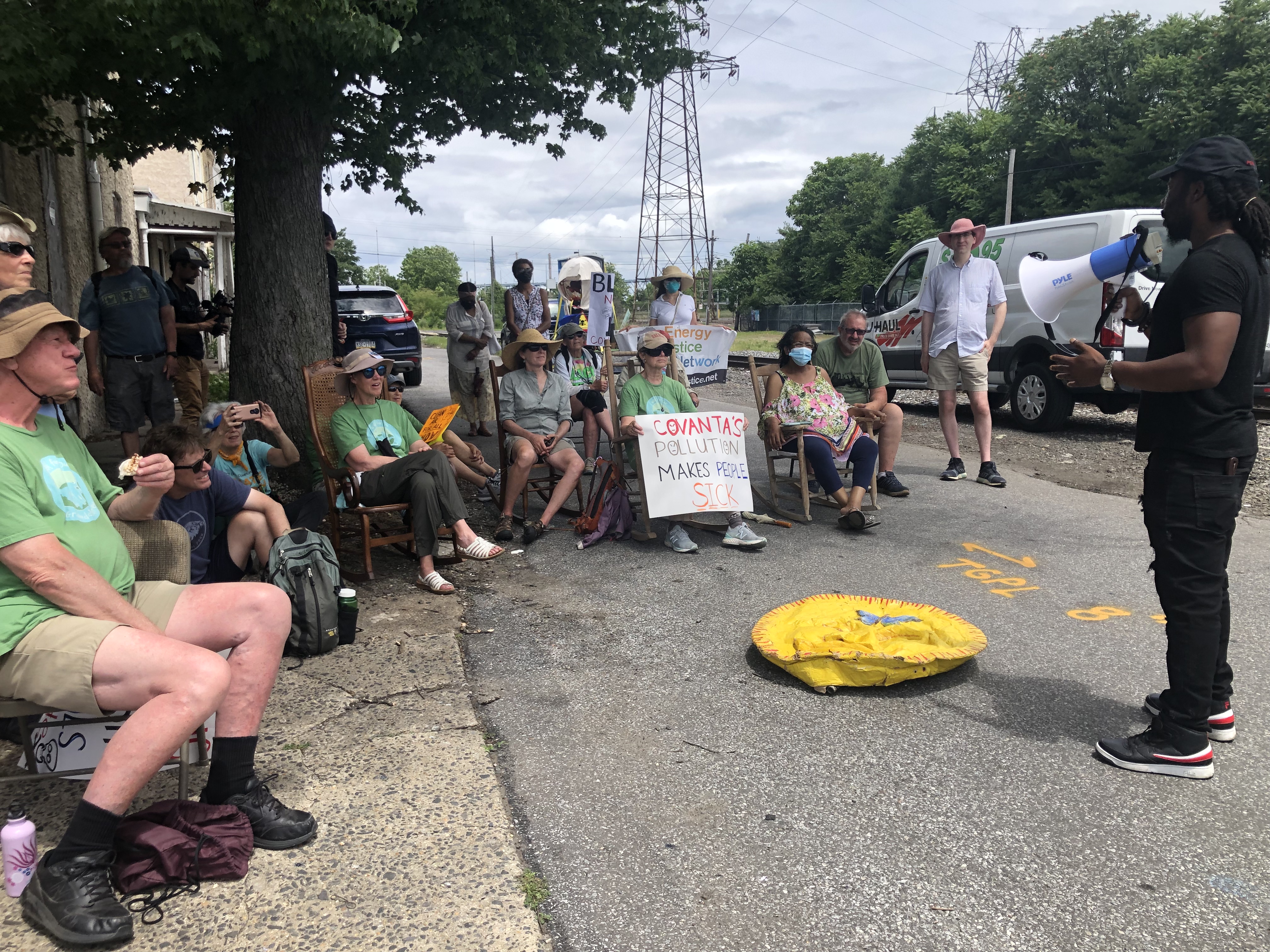
Members of the Chester Residents Concerned for Quality Living (CRCQL) group greeted the walkers at the gate to the polluting Covanta waste incinerator in Chester. There, community leaders from Chester shared their personal stories, including being forced to abandon their homes adjacent to the facility, the persistent noxious odors, and high rates of asthma, particularly among children. CRCQL leader Zulene Mayfield, who has been fighting environmental injustice in Chester for decades, shared the history of how the toxic Covanta facility was deliberately placed in Chester, a predominantly Black community.
“We welcome the support of the Walk for Our Grandchildren to highlight the issues that we have been facing here in Chester for years,” Zulene Mayfield stated, “The toxic Covanta incinerator is one of the most egregious examples of environmental racism in the country, and we call upon the Delaware County Council to end its contract with Covanta so that our children and families can breathe.”
The grandparents then traveled to Marcus Hook municipal park overlooking the Delaware River, where they had a clear view of the INEOS ships transporting ethane from the processing plant in Marcus Hook to Europe to be manufactured into single-use plastics.
Members of Marcus Hook, Trainer, and Chichester Residents for Public Health spoke to the many impacts to public health and safety that have resulted from the Sunoco / Energy Transfer Mariner East pipelines and the Marcus Hook Industrial Complex. Residents expressed a need for more information, education, and community wide awareness of the links between pollution and health impacts.
“Our fight in Marcus Hook is to make residents aware of the health issues and what they can do about them,” said local resident Lorraine Daliessio, “We have an Environmental Advisory Council made up of both residents and refinery representatives but many residents are not aware of the part they can play, or even that the EAC exists. We need awareness.”
Residents in both Chester and Marcus Hook, as well as surrounding communities such as Trainer and Upper and Lower Chichester bear the brunt of the pollution impacts from the refineries and incinerators along the Delaware River in the southern part of the County. In all of these communities, residents are holding out hope that the newly formed Delaware County Health Department will help to analyze the impacts of pollution on public health in these communities, and that change may finally come after decades of injustice and harm. The Clean Air Council has been supporting these community organizing efforts through our outreach, advocacy, and legal work.
Eve Miari, Advocacy Coordinator for Clean Air Council, added, “Residents in communities impacted by toxic air pollution are coming together and saying loudly and clearly, we have had enough. Enough environmental injustice, enough environmental racism, enough prioritization of private profit over public health. We have a right to clean air, pure water, and a healthy environment. We have the right to breathe.”
For more information contact Eve Miari, Advocacy Coordinator, emiari@cleanair.org
